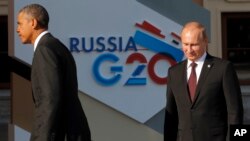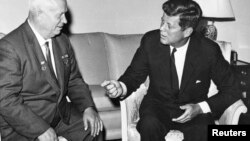Tough talk among both U.S. and Russian officials over Ukraine has raised questions -- mostly among observers, journalists and public opinion pollsters -- about whether or not the United States and Russia are sliding towards a new Cold War.
Rasmussen Reports, a U.S.-focused public opinion polling organization, tackled that very question in a new poll.
It asked likely American voters whether or not the political turmoil in Ukraine has taken us back to the days before the collapse of the Soviet Union in 1991, a period that saw decades of chilly relations that brought the U.S. and Russia to the brink during the Cuban Missile Crisis of 1962.
"What you see, not surprisingly, is people 40 [years old] and over are much more alarmed. They are much more likely to see the Russians as an enemy, they are much more likely to say 'here we go again,'" said Fran Coombs, Managing Editor of Rasmussen Reports.
Coombs, who grew up during the so-called "duck and cover" era, said younger respondents, those aged 39 and younger, were less likely to have Cold War jitters, despite rising concern about US-Russian relations.
Rasmussen’s survey found that around 45 percent of likely voters believe the two superpowers will return to a Cold War relationship, up nine points since last August following Russia's decision to grant temporary asylum to American NSA leaker Edward Snowden.
While the poll did not try to address why Americans are worried about Russia, Coombs believes it is clear that the recent news from Ukraine is not the only the reason.
"Headlines drive a lot of people's thinking," he said. "Putin gets terrible press, he doesn't really care what the United States thinks. The Snowden thing…Russia has had bad press in this country for a while, and you see it spike when something like this happens."
Coombs said that foreign policy surveys like this tend to reflect heightened media coverage, suggesting that the very idea of another Cold War comes to mind when key events are reported over and over again in a saturated media environment.
But be careful of using the phrase Cold War – in its purest historical context -- to assess how serious current U.S.-Russian tensions are, said Frida Ghitis, world affairs columnist for the Miami Herald and World Politics Review.
While Ghitis firmly believes that we are witnessing a new Cold War, she said today’s dynamics are very different: the US-Russia “reset button” policy of years past is now clearly over.
“I think what we’re seeing now is the end of a phase of the post-Cold War phase of trying to develop a cooperative relationship between Russia and the West,” Ghitis said. “You know, we use the term ‘Cold War’, and we use the term loosely. It’s really a completely different situation now. In those days…it was a bipolar world – the United States and the Soviet Union – each leading a large bloc with conflicting ideologies. It was a rivalry of power and ideologies. We don’t really have that rivalry of ideologies anymore.”
Still, the deployment of Russian troops to Crimea, which Putin has defended as merely protecting Russian bases there, has the feeling of a new Cold War, according to Charles Kupchan, Senior Fellow at the Council on Foreign Relations, even if one cannot pinpoint exactly where the point of no return is.
“What happened in the Crimean Peninsula, the readiness of Russia to violate the territory of one of its neighbors, occupy that land and potentially rip it away from a country to which it legally belongs, that is a profound violation of the rules of the road,” Kupchan said in an interview with VOA's Russia service. “I am guessing this is not a turning point in which we will say the Cold War has returned, but that outcome is not out of the question.”
But Ghitis counters that the most accurate way to describe today’s U.S.-Russia rivalry might be as a kind of not-so-hot Cold War.
Rasmussen Reports, a U.S.-focused public opinion polling organization, tackled that very question in a new poll.
It asked likely American voters whether or not the political turmoil in Ukraine has taken us back to the days before the collapse of the Soviet Union in 1991, a period that saw decades of chilly relations that brought the U.S. and Russia to the brink during the Cuban Missile Crisis of 1962.
"What you see, not surprisingly, is people 40 [years old] and over are much more alarmed. They are much more likely to see the Russians as an enemy, they are much more likely to say 'here we go again,'" said Fran Coombs, Managing Editor of Rasmussen Reports.
Coombs, who grew up during the so-called "duck and cover" era, said younger respondents, those aged 39 and younger, were less likely to have Cold War jitters, despite rising concern about US-Russian relations.
Rasmussen’s survey found that around 45 percent of likely voters believe the two superpowers will return to a Cold War relationship, up nine points since last August following Russia's decision to grant temporary asylum to American NSA leaker Edward Snowden.
While the poll did not try to address why Americans are worried about Russia, Coombs believes it is clear that the recent news from Ukraine is not the only the reason.
"Headlines drive a lot of people's thinking," he said. "Putin gets terrible press, he doesn't really care what the United States thinks. The Snowden thing…Russia has had bad press in this country for a while, and you see it spike when something like this happens."
Coombs said that foreign policy surveys like this tend to reflect heightened media coverage, suggesting that the very idea of another Cold War comes to mind when key events are reported over and over again in a saturated media environment.
But be careful of using the phrase Cold War – in its purest historical context -- to assess how serious current U.S.-Russian tensions are, said Frida Ghitis, world affairs columnist for the Miami Herald and World Politics Review.
While Ghitis firmly believes that we are witnessing a new Cold War, she said today’s dynamics are very different: the US-Russia “reset button” policy of years past is now clearly over.
“I think what we’re seeing now is the end of a phase of the post-Cold War phase of trying to develop a cooperative relationship between Russia and the West,” Ghitis said. “You know, we use the term ‘Cold War’, and we use the term loosely. It’s really a completely different situation now. In those days…it was a bipolar world – the United States and the Soviet Union – each leading a large bloc with conflicting ideologies. It was a rivalry of power and ideologies. We don’t really have that rivalry of ideologies anymore.”
Still, the deployment of Russian troops to Crimea, which Putin has defended as merely protecting Russian bases there, has the feeling of a new Cold War, according to Charles Kupchan, Senior Fellow at the Council on Foreign Relations, even if one cannot pinpoint exactly where the point of no return is.
“What happened in the Crimean Peninsula, the readiness of Russia to violate the territory of one of its neighbors, occupy that land and potentially rip it away from a country to which it legally belongs, that is a profound violation of the rules of the road,” Kupchan said in an interview with VOA's Russia service. “I am guessing this is not a turning point in which we will say the Cold War has returned, but that outcome is not out of the question.”
But Ghitis counters that the most accurate way to describe today’s U.S.-Russia rivalry might be as a kind of not-so-hot Cold War.





